Dec 17, 2024 – Meeting with Social Leaders
Good morning. A new day has dawned at the Seoul Jungto Center.
After completing his early morning practice and meditation, Sunim headed to the Jungto Social and Cultural Center at 7 AM. Since returning to Korea, many social leaders have been seeking Sunim’s advice amidst the chaotic political situation.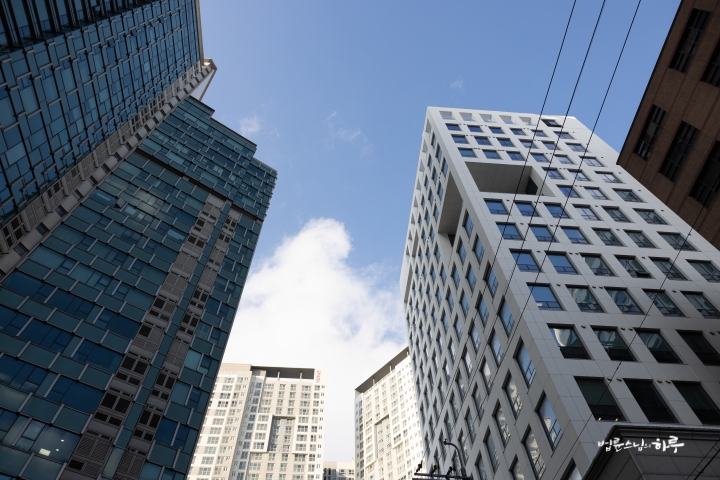
Early in the morning, former congressman Kim Doo-kwan visited and had breakfast with Sunim while discussing current affairs. Sunim emphasized the need to amend the constitution to distribute some of the president’s powers to a cabinet led by the prime minister, and to revise the election law to create a political structure that enables cooperation between ruling and opposition parties. This would prevent such unfortunate events from recurring in the future. Kim deeply agreed with Sunim’s view that although the current political situation is chaotic, if the ruling and opposition parties work together to overcome this crisis, it could become an opportunity for political development.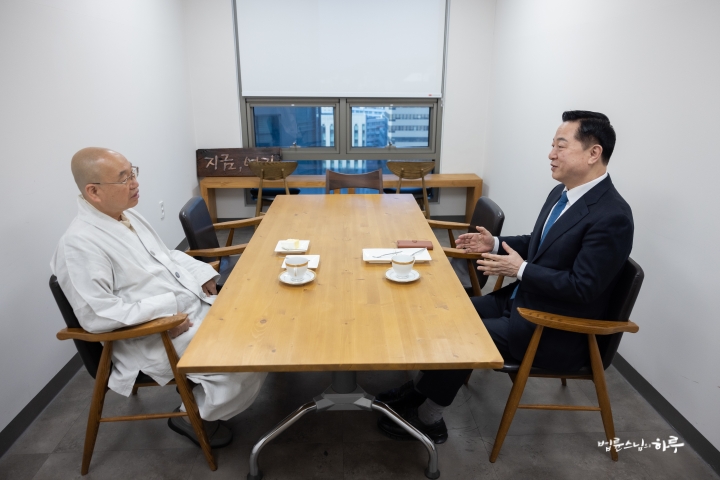
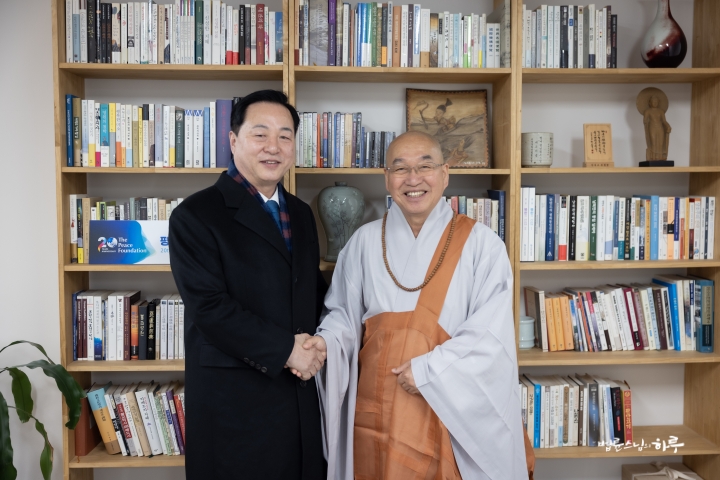
At 9:30 AM, former Gyeongnam Governor Kim Kyoung-soo visited Sunim to greet him upon his return. Kim, who had been studying in the UK, had met with Sunim several times during his European lecture tour. He returned to Korea early on the 5th after learning about the national crisis triggered by the president’s declaration of martial law. Upon hearing that Sunim had returned from his visit to Mindanao, Philippines, he came to pay his respects.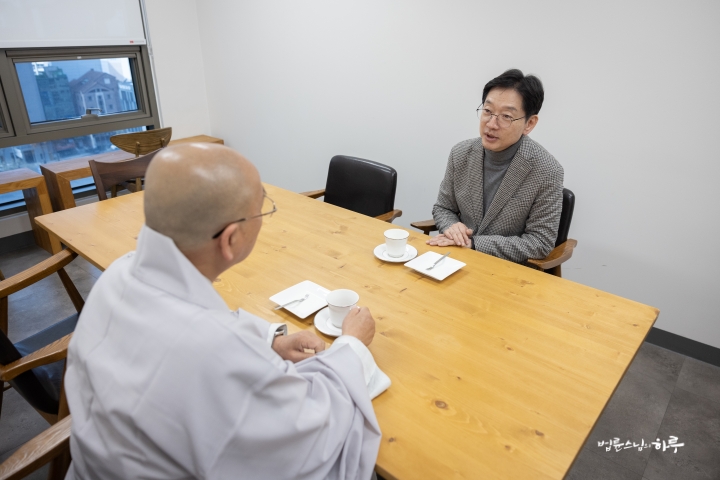
Sunim, having just returned from the school inauguration ceremony in Mindanao, introduced his overseas relief activities, including projects in Syria and Bhutan. Kim asked for Sunim’s opinion on how the political situation might unfold after the declaration of martial law and the passage of the presidential impeachment motion, and how to respond. They had an extensive discussion on these matters.
“I’ll visit you again next time. Thank you.”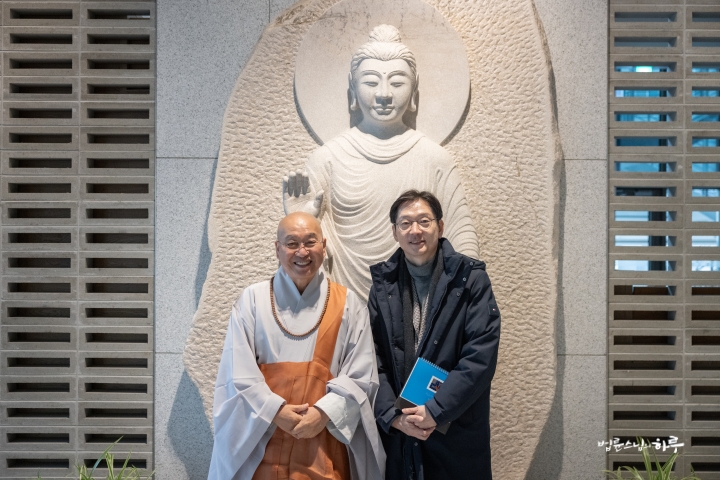
At 11:30 AM, Sunim held a meeting with the JTS Secretary General to discuss next year’s overseas relief projects and Sunim’s schedule for visiting overseas project sites. They discussed various topics, including sending volunteers for sustainable development projects in Bhutan, before concluding the meeting.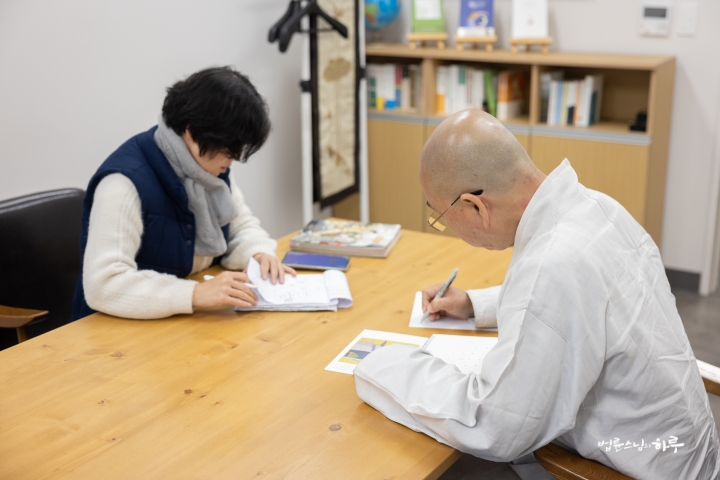
Following this, Sunim received a report from Dharma Teacher Beopdeung, who is in charge of the overall coordination for the India pilgrimage, and discussed practical preparations.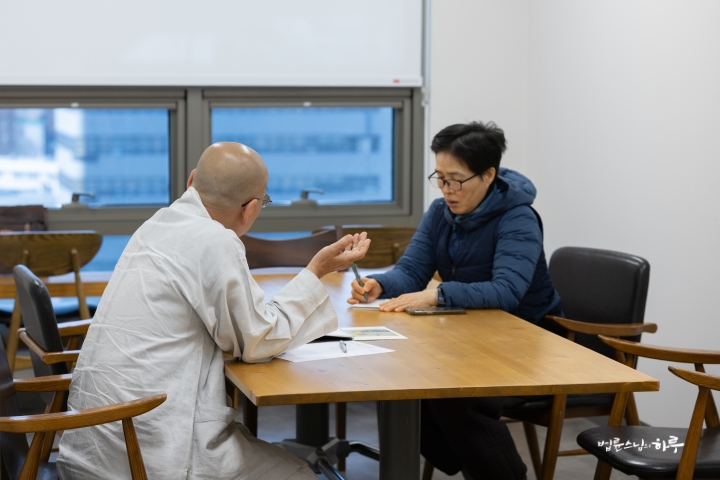
In the afternoon, Sunim worked indoors or rested, relieving the accumulated fatigue from his recent demanding schedule.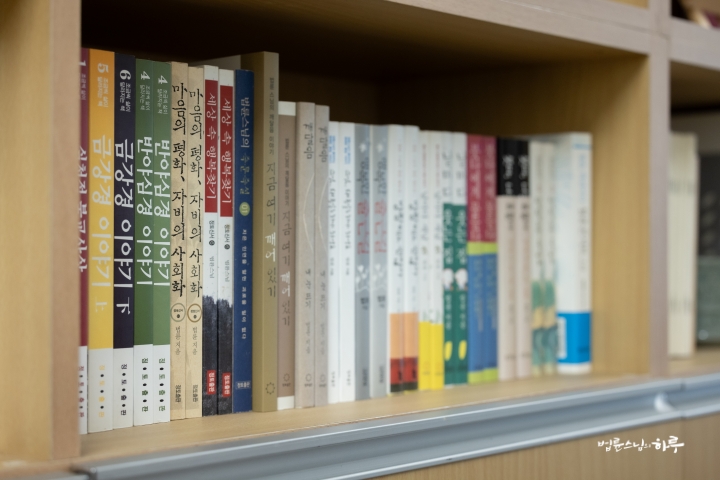
As there was no Dharma talk today, we conclude this post by sharing a question about the current political situation and Sunim’s response from yesterday’s Happy Dialogue Q&A session held in Seongnam, Gyeonggi Province.
How Should We Approach This Period from the President’s Declaration of Martial Law to the Constitutional Court’s Ruling?
“To summarize the current situation in one phrase, it could be described as ‘fortunate in misfortune.’ The martial law declared this time should never have happened. It’s a regrettable incident. Our country has been recognized as a developed nation by the international community, and the Korean Wave is sweeping across the world. When I travel around the world, I see that the favorability towards South Korea is continuously increasing, and the number of foreign visitors to our country is growing. However, this coup has led to a decline in our national prestige, and both our security and economy are now in crisis. It’s not that martial law was declared due to a national emergency; rather, an incorrect declaration of martial law has put the nation in a state of emergency. But what can we do? It has already happened.
This martial law can be described as a palace coup in reality. However, this coup attempt failed within six hours. It’s truly unfortunate that an unconstitutional coup occurred again in the Republic of Korea, a liberal democratic country, after 45 years. But it’s also remarkable that the opposition party and citizens took the lead in stopping it within six hours, which is rare in world history. In this respect, people around the world are highly appreciating the citizens of South Korea.
South Korea, which has driven out military dictatorships through democratic movements and worked to foster liberal democracy in various fields, has achieved remarkable economic growth that is hard to find in world history. The fact that a palace coup occurred in such a country indicates that there must be a vulnerability somewhere in South Korea. Fortunately in this misfortune, the country was normalized within six hours through democratic procedures, which also means that democracy has taken firm root in South Korea. This implies that there are both very unstable and very stable elements coexisting within South Korea today.
How was it possible for an unconstitutional martial law to be declared under the pretext of ‘eradicating anti-state forces’ and for armed soldiers to invade the National Assembly in a country where democracy has developed to this extent? This was possible because our country is divided between North and South and they are in a hostile relationship. This is where South Korea’s vulnerability, or ‘Korea risk,’ lies. The person who initiated this palace coup attempted to avoid the crisis they were facing by declaring martial law under the pretext of eradicating anti-state elements, using North Korea as an excuse. The temptation to attempt a coup to avoid a crisis situation arisesIt is because the North and South are divided. This is sometimes referred to as the ‘North Wind,’ but it’s not just South Korea; North Korea also uses the South to maintain its dictatorial power.
Until now, we had forgotten, but this incident has clearly shown how much the reality of North and South being in a hostile relationship can negatively impact our society’s safety. This is not just because North Korea might provoke, but because it can be exploited within South Korea as well, making it a major cause of social instability.
This applies not only to politics but also to the economy. There is a constant risk of war between North and South, and if war breaks out, the South Korean economy would completely collapse. The economy of our neighboring country, Japan, has almost no possibility of collapsing in a day. There’s no chance of a sudden war breaking out in Japan. But our country is different. We are in a condition where war could break out tomorrow morning. We have an instability like a castle built on sand. From an objective perspective, the division between North and South and their hostile relationship is the reality of our country. Therefore, to solidify the safety of our society, we must resolve the hostile relationship between North and South as soon as possible. The fundamental cause of the ‘Korea risk’ mentioned earlier is based on this division.
Despite this crisis that could erupt at any moment, thanks to the efforts of citizens for economic development and democracy over the past half-century, we were able to quickly resolve this situation. Typically, security organizations like the military or police don’t deliberate ‘Should I follow this? Should I disobey?’ when an order is given. They just follow their superiors’ orders. This was the case during the May 18 Gwangju Uprising in 1980, and before that during the December 12 incident. But now, because democracy has firmly taken root, even soldiers or police are reluctant to follow illegal and unconstitutional orders like ‘ake this opportunity to arrest everyone and clean things up.’ They follow orders, but in their hearts, they keep thinking ‘This isn’t right.’ So even when soldiers were ordered to ‘Break the windows of the National Assembly and drag the lawmakers out,’ they not only didn’t follow the orders but also apologized several times as they left. This shows how deeply democracy has already taken root among the majority of citizens. Of course, there are still some who aren’t like this.
So we’ve confirmed through this incident that while there’s a possibility for those with power or authority to attempt a coup by exploiting the state of division, it’s very difficult for such an attempt to succeed. Having seen this failure, the risk of such attempts should be somewhat lower in the future. Of course, the potential danger still exists. However, we can see that it will be even more difficult for a coup to succeed.
We should learn from the events that have occurred. We need to be able to evaluate the good and bad aspects, the unstable and stable aspects of our society. This palace coup should not have happened, but since it has already occurred, what we need to do now is to learn lessons from it. Until now, the younger generation in their teens or twenties didn’t really know about how their parents’ generation fought and shed blood to achieve democratization. They thought it was something they could naturally enjoy like air, but by observing and participating in the series of events from the declaration of martial law to impeachment, they’ve gained a significant learning effect about democracy, which can be evaluated positively.
Moreover, at the recent Yeouido rally, there were more young people than older people like me. An enormous number of teenagers and people in their twenties, especially women, gathered and waved light sticks. Instead of chanting slogans in serious voices and singing activist songs like in the past, they sang K-pop as if it were a festival. This has created a new culture of assembly and demonstration. South Korea has now become a country that even exports its assembly and demonstration culture. Just as the candlelight vigil culture was exported to Hong Kong and Taiwan, our country’s new assembly and demonstration culture will be exported to many foreign countries in the future. They have transformed assemblies and demonstrations from something scary with rampant violence into a festival-like play that people can enjoy together. So, from the perspective of educational effects on democracy, there are many positive aspects, and I want to say that this incident doesn’t only have negative points.
However, from a national perspective, there are inevitably massive economic losses and significant diplomatic losses. Right after Trump became the U.S. President, we needed to somehow resolve the tariff attack diplomatically through a summit meeting, but due to the absence of our top leader, all these relations between leaders have to be postponed. So there will inevitably be great difficulties in the diplomatic field in the future, and we cannot avoid economic losses in national investments, damage to national prestige, a decline in national credibility, and the ‘Korea discount.’
It can be said that a national emergency has occurred and then martial law has been declared, but rather the declaration of martial law caused a national emergency. Because this state of national emergency has occurred, the ruling and opposition parties should join hands and put their heads together to study how to overcome this crisis. If they fight over who did well or poorly, or who will gain what benefits in the future, it would be an act of pushing the country into a real crisis situation.
We all have different beliefs and different facial features. But our common ground is that we are citizens of the Republic of Korea, and what defines us as citizens of the Republic of Korea is the Constitution. So when we define this incident, we should make our arguments within the framework of the Constitution of the Republic of Korea. If you step outside the framework of the Constitution, you are not a citizen of the Republic of Korea. That’s what we call an anti-state criminal. Especially the President is someone who should uphold constitutional values. For example, when I became a monk, I didn’t put my hand on the Constitution and swear ‘I will uphold the Constitution of the Republic of Korea.’ But the President must put their hand on the Constitution and swear to uphold it. So, did the President really uphold the Constitution well? First, the act of declaring martial law is stipulated by law. However, it states that martial law can be declared during wartime or quasi-wartime conditions. Even if it’s not war, martial law can be declared in exceptional cases where the administrative order has completely collapsed, allowing the military to take charge of domestic security. Only in such cases can the military replace the police, replace the judiciary, control the media to some extent, and control individual freedoms to a certain extent, as stipulated by law. So, was our society in such chaos that social order couldn’t be maintained with police force alone, as if a riot had broken out? Do you think so?”
“No, it wasn’t.”
“So this incident can be seen as violating the Martial Law Act because it doesn’t meet the requirements for martial law. However, the President himself claims otherwise. Since there are differing views, this will need to be decided by the Constitutional Court in the future.
But even if the requirements for martial law were met, there’s another problem in this case. Even if the declaration of martial law was legal, it cannot control the National Assembly, which represents the sovereignty of the people. Martial law is for maintaining social order, not for usurping the sovereignty of the people. However, during this martial law declaration process, when members of the National Assembly tried to enter the National Assembly to lift the martial law, they were blocked from entering. Also, soldiers came to the National Assembly building by helicopter, broke windows to enter, and although not executed, they attempted to arrest and drag out the members of the National Assembly. These are illegal acts not provided for by law and violate the Constitution. Violating the Constitution is an anti-state act. That’s why this is being called an act of rebellion.
Some may argue that the declaration of martial law didn’t cause such chaos in society, but this is a violation of the Constitution by someone who should be protecting it, so whoever it is must be prosecuted according to the law without exception. In my view, it seems difficult to escape this part.
As the ruling party, they might support the President because he’s on their side, but if they oppose the impeachment motion even for actions that attempted to control the National Assembly and arrest members of parliament because it’s disadvantageous to their party, this is very wrong. If you deny the Constitution, it’s an anti-state act, and if you defend it because it’s on your side, then the ruling party is misunderstanding this situation. Of course, views can differ, and given how much their interests are at stake, this might happen, but this is an act of defending or sympathizing with anti-state criminals. Even within the ruling party, a minority voted in favor of the impeachment motion because they saw this issue as wrong. They shouldn’t be called traitors for this. Betrayal is betraying the people and violating the Constitution, not trying to uphold constitutional values. I think it would be good to view this incident from this perspective.
Now that the President’s authority has been suspended, the Constitutional Court must rule on the impeachment within 6 months at the latest. During this time, the acting President is only supposed to maintain the status quo minimally. So we’ll have to bear the diplomatic and economic losses, but it could be decided in a month or two if it’s short, or up to 6 months if it’s long. However, the longer it takes, the greater the loss to national interests. There’s also a risk that the impeachment could be rejected by the Constitutional Court. There are 9 Constitutional Court justices, and 6 of them need to agree for the impeachment to be upheld. But currently, there are only 6 justices, so if just one opposes, it could be rejected. Therefore, the 3 additional Constitutional Court justices allocated to the National Assembly should be appointed quickly to fill the positions. 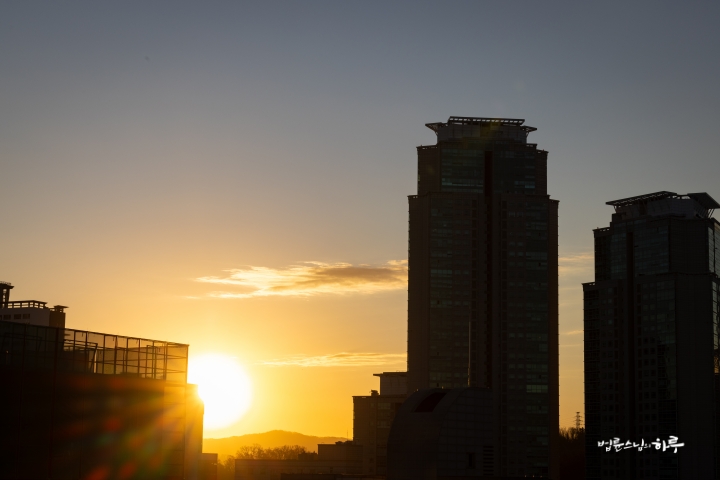
“If the impeachment is rejected, it would go against public opinion, likely leading to even greater social unrest than we’re currently experiencing. This would escalate the current state of emergency into an even more severe one. If possible, following a process where the next administration is formed through a new election would reduce both the duration and the level of confusion. This would be the ‘best of a bad situation.’ If this doesn’t happen, the entire nation will suffer a significant loss. Nevertheless, I believe the Republic of Korea will be fine. I think this way because we have extraordinary citizens.”
“Thank you.”
Tomorrow, Sunim will attend a morning meeting of religious leaders for national reconciliation and peace. He will then conduct a live broadcast of the year-end Dharma assembly for the daytime group. In the afternoon, he will appear on tvN’s ‘You Quiz on the Block’ for a recording session. In the evening, he will conduct another live broadcast of the year-end Dharma assembly for the evening group.




